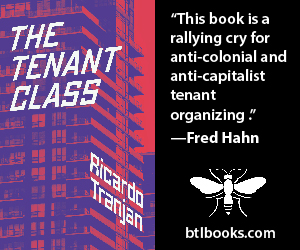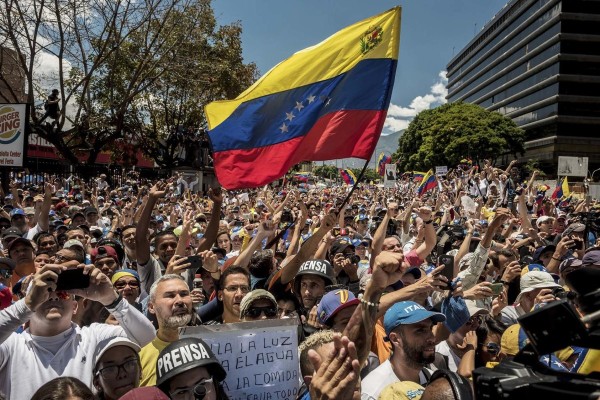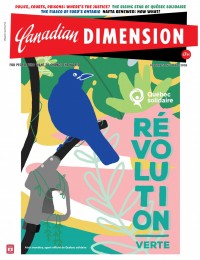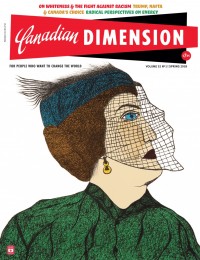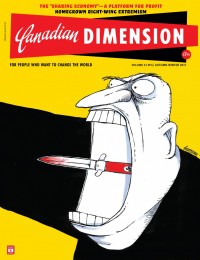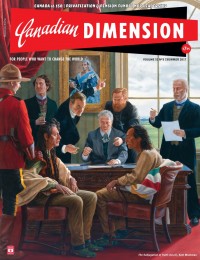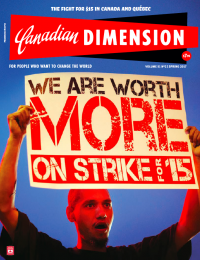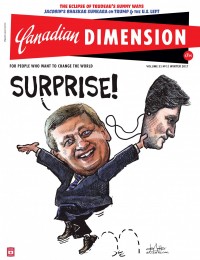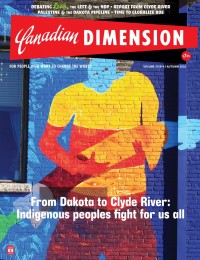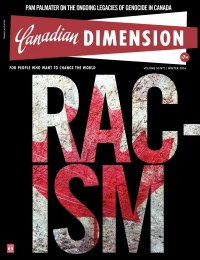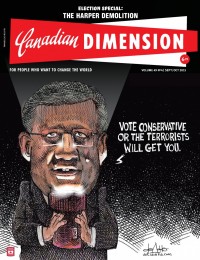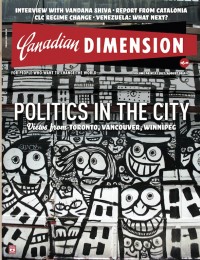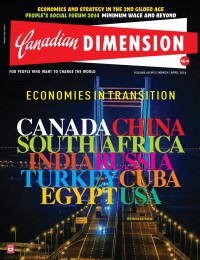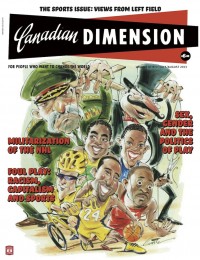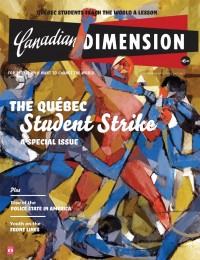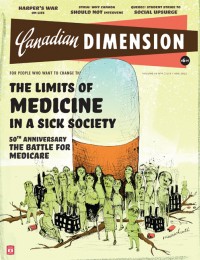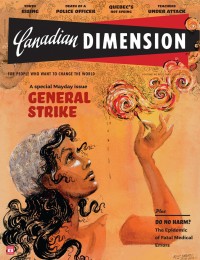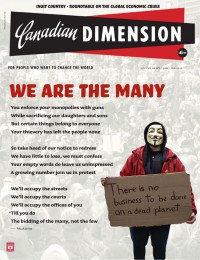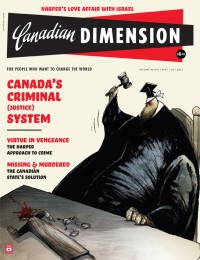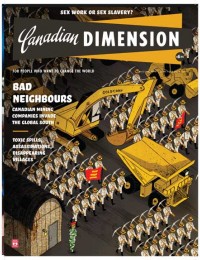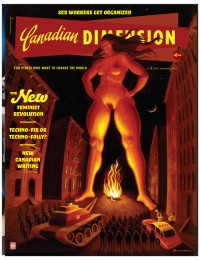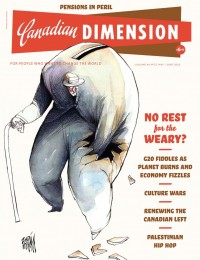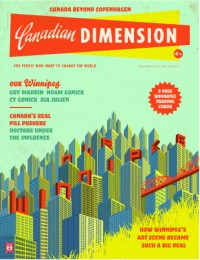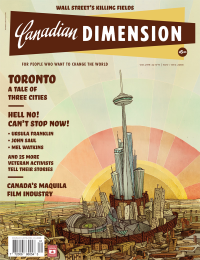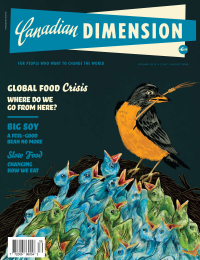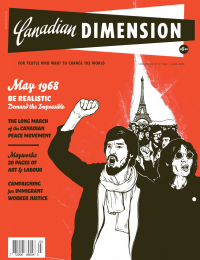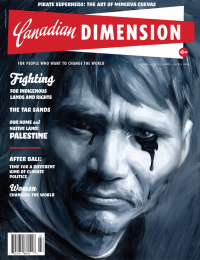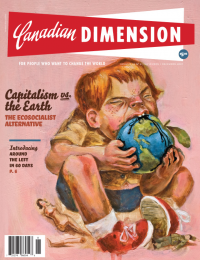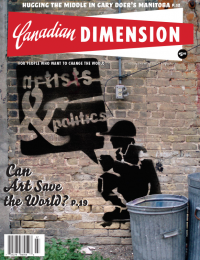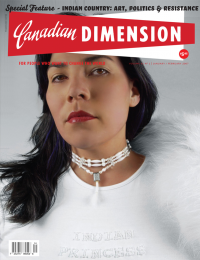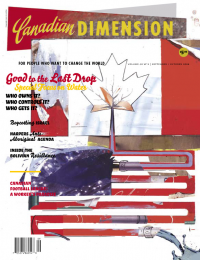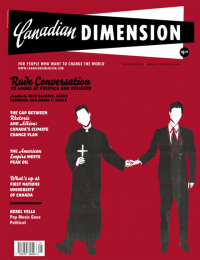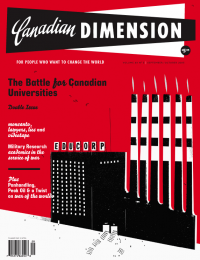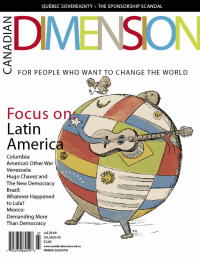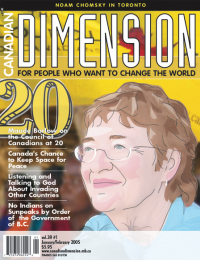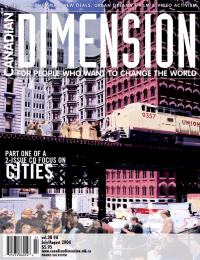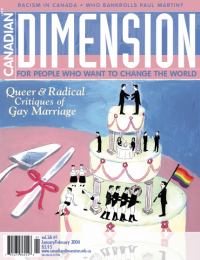Promoting Intelligence
Toronto duo stokes the fire of original hip hop and its political roots

The Dope Poet Society’s front man, Professor D, strides on stage with a rapper’s typically confident air. Snatching the mic with one hand, he thrusts the other straight up, V-shaped fingers projecting peace to the thousands gathered at Metro Hall Square for the Global Day of Protest.
The crowd’s intensity is swelling to a feverish pitch, already pumped by a spirited march down Yonge Street. Amid a cacophony of beating drums, honking air horns, singing and chanting, a megaphone pierces above the collective clamour: “One, two, three, four, we don’t want your racist war. Five, six, seven, eight, we will not cooperate.” The throng of anti-war demonstrators joins in with the hypnotic chant, collectively fuelling the already adrenaline-drenched air.
Given the cue, Professor D slams his head down, thick, long dreads arcing around him like a racehorse’s mane as he rips into a verbal torrent: “It’s not a war on terrorism, it’s a war of terrorism. Neo-imperialism, you know that money is the reason. America is killing for oil not for freedom.” Building on the crowd’s energy, the Dope Poet strides across the stage, slicing and dicing his lyrical language to a roar of approval.
Professor D believes in hip hop’s artistic ability to catalyze social change. While most mainstream rappers commodify Hip Hop culture in a celebration of crime and consumerism, he uses the art form’s inherent journalistic capacity by rhyming about a wide range of issues across the political and social-justice spectra. Drawing inspiration from Martin Luther King and Malcolm X, Professor D crafts lyrics to represent his listeners’ political views, hopefully reviving a genre that’s lost its way from its socially conscious golden age of the 1980s.
Equally important to the Dope Poets’ message is its vehicle: Justus League Records, Professor D and DJ Spinister’s independently owned record label. Free from the shackles imposed by major record companies, they are able to release content that truly expresses how they feel. Their latest concept album, ProIntelPro (short for Promote Intelligence Program), exemplifies their lyrical approach to political discourse. The title of this particular release is a response to the FBI’s infamous CoIntelPro (Counter Intelligence Program), described on the CD’s liner notes as “a program that existed to spread lies and deception in reaction to the revolutionary movements of the 1950s and 1960s.” Focusing on current affairs, the Dope Poets aim most of their cutting rhetoric directly at the Bush Administration. Controversial? Definitely. For most hip hop consumers, accustomed to less serious topics, this album’s political content may seem a bit much. Yet, their popularity has never been greater.
The Dope Poets’ vibe resonates with those frustrated by a lack of democratic influence in an increasingly hostile world. These listeners turn to this style of conscious music as something to rally behind. Though the Dope Poets do take a milder, more reflective tone in some of their music, those instances are overshadowed by rants against George Bush and other political figures. Their direct approach is common among many musician-activists who choose to fight back against those who initiate war and injustice, rather than simply promote peace through the tragic retelling of war. Some love this directness, some don’t.
D wouldn’t have it any other way. Speaking about his childhood, he recalls often getting into trouble while standing up for his principles. “I always had this inability to stand by and watch injustice being perpetrated,” he says. Growing up listening to acts like Public Enemy and KRS-One during hip hop’s socially conscious golden age, his next step naturally was to combine his love of hip hop with his desire for justice. It’s a tough way to try to succeed in a market that has become dominated by more commercially viable topics like cars, booty and bragging. But D’s resolve never wavered. Instead, he decided to stay true to conscious hip hop, rather than succumb to mainstream influence (see sidebar: “Conscious Hip Hop in a Commercialized World”).
Not only did he stick with hip hop, he’s helping to redirect the culture from its misguided path. By rhyming hardcore about political issues, D uses the persuasive power of rap to bring issues to the forefront of people’s minds and the media. By rapping aggressively, he’s drawing attention to rap’s ability to report on issues and create change. D steadfastly believes in the genre’s transformative potential, which he feels is too often squandered by mainstream hip hop acts. He expresses shock at the number of rappers wasting their exposure rapping about irrelevant topics when they could be releasing music that’s socially relevant. “If those guys weren’t trying to cater [to record labels’ wishes] their music would be more conscious,” he asserts.
Despite his frustration with mainstream rappers, D still believes it’s important to form ties in the larger hip hop community. He started building solidarity by collaborating with artists like Public Enemy, dead prez and Jeru the Damaja. He desires to see the day when all rappers recognize their commonalities and unite for the greater good. “On certain issues we stand together,” he says hopefully. “Against the war in Iraq, against homelessness, starvation and other major issues. That’s actually what hip hop has the power to fight against, influence and change.”
The Dope Poets believe all positive change should begin with improving the local community. Their community-development project, the Toronto Hip Hop Cultural Centre (temporarily closed for restructuring), is located in Toronto’s inner-city Junction neighbourhood. At this centre, the Dope Poets have engaged the community through a number of free activities, including regular break-dance workshops, freestyle MC sessions, community-improvement discussions and film screenings. The centre exemplifies the Dope Poets’ holistic approach to the art and culture of hip hop. “The highest form of consciousness is the understanding of the interconnectedness of all things, living and non-living,” D says. “Everything depends on everything else and we are responsible for our participation in that process.”
In a scene from the 1989 film Dead Poets Society, a radical schoolteacher (Robin Williams) asks his students to rip out a section of their textbook that he disagrees with and refuses to teach. By challenging authority, he inspires his students to develop their own identities. Similarly, by challenging the hegemonic, imperialist power structure, the Dope Poet Society promotes freedom of thought by asking listeners to question authorities and laws. They’re labeled as controversial – and that’s the point. Hip hop’s gone such a long way down the wrong path, it’s losing its ability to use controversy for any worthwhile gain. The Dope Poets are frustrated that Hip Hop is losing its original street-reporting value. Their response: Use the genre’s in-your-face shock value to bring it back.
Kevin Bottero publishes The Mindful Word, a journal of engaged living. For more, visit: www.themindfulword.org.
This article appeared in the July/August 2008 issue of Canadian Dimension (Food and Hunger).


